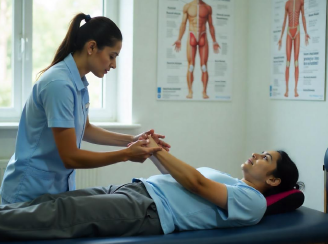

Book a home chest physiotherapy session today.
Enquire Now
Feeling a bit “stuffed up’ or finding it hard to clear your lungs? At Apollo Home Healthcare, we understand how vital clear breathing is for your overall well-being. Many people experience challenges with breathing, especially when dealing with certain health conditions. That’s where Chest Physiotherapy (CPT) comes in, a gentle yet powerful set of techniques designed to help you breathe more freely and live more comfortably. In this comprehensive guide, we’ll explore everything you need to know about CPT, from what it is to how it works and who can benefit. Let’s start with the basics! Physiotherapy, often called physical therapy, is a healthcare profession focused on helping people improve their movement, manage pain, recover from injuries or illnesses, and prevent future problems. Think of it as a way to “re-educate” your body to move and function better. Physiotherapists use various methods such as exercises, manual therapy (hands-on techniques), and education to help you achieve your health goals. Now, let's zoom in on the chest! Chest Physiotherapy (CPT) is a special type of physiotherapy that focuses specifically on your lungs and airways. Its main goal is to help loosen and remove excess mucus or phlegm that can build up in your lungs. When mucus gets thick and sticky, it can block your airways, making it hard to breathe and increasing the risk of infections. CPT uses a combination of physical techniques and breathing exercises to help you cough out this mucus, making your breathing easier and more efficient. CPT isn't for everyone, but it's incredibly helpful for individuals who have trouble clearing their airways naturally, particularly those for whom hospital visits are difficult or uncomfortable. Apollo Homecare brings expert care to you. You might benefit from CPT if you have conditions that cause a lot of mucus to build up, such as: Our integrated approach at Apollo Homecare Services ensures you receive the right, personalized treatment plan for your specific needs, right where you’re most comfortable.Breathe Easier, At home: Your Complete Guide to Chest Physiotherapy (CPT)
Overview: What Exactly is Physiotherapy?
So, what is Chest Physiotherapy?
Who Needs Chest Physiotherapy?

Apollo Homecare physiotherapists enhance mobility, healing, and well-being.
Enquire Now

Apollo Homecare physiotherapists specialize in healing, mobility, and well-being.
Enquire Now

Apollo Homecare physiotherapists enhance mobility, healing, and well-being.
Enquire Now

Expert sports injury rehab and performance therapy delivered at home.
Enquire Now

Personalized disc pain relief and recovery exercises in the comfort of your home.
Enquire Now
Let our Expert Help you